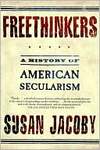 Freethinkers: A History of American Secularism
Freethinkers: A History of American Secularism
By Susan Jacoby
Holt Paperbacks, 448 pages
ISBN-10: 0805077766
Reviewed by Dan Vera
I was a history major in college and have retained a deep interest in historical subjects. I consider myself pretty well-read in history. My time in seminary and a lifetime in the church also left me with what I thought was a pretty good sense of the religious history of the United States. Then I picked up a copy of Susan Jacoby’s best-selling book Freethinkers: A History of American Secularism and discovered how little I really knew. It would seem strange that a book about the secularist history of the United States would teach me so much about American religious history but as is often the case, you need to know both sides to understand the full story. Having read and enjoyed this incredibly well-researched and thought-provoking book, I now realize that what I most love about the religious contributions to American culture were forged and informed by its progressive and open exchange with secularists and freethinkers.
Freethinkers came out in 2004 and spent some time on the New York Times best seller lists so it is widely available in paperback now. I can say without reservation that it is the best book I’ve read this year and perhaps the most mind-altering book of history I’ve read in the last ten years. I cannot think of another book that left me with a clarifying “aha!” moment on almost every single page. I tend to read a few books at a time and I’ve enjoyed savoring Jacoby’s writing. It is laid out in chronological order but its abundance of new information of a largely overlooked section of American history makes it an almanac of sorts on those figures who stood for free expression, for reason, and for a clear separation of church and state. There were many misconceptions about religion in American history that were deflated by this book. One discovers that in the colonial period it was the South, in states like Virginia and Georgia that the power of religion and of church structures was most fought, most notably by founding fathers Jefferson and Madison. The northern states were zealous in their desire to have an established church and to have religious tests for office-holders. It was Baptists in the South who, fearing the dominance of the Anglican/Episcopal church, wanted no church sponsorship of religion. Of course this geographic split would be reversed in a generation in ways that would echo the culture wars we are currently living in. This is the gift of Jacoby’s book. So many “how did we get here?” questions, whether we have even known to ask them, are answered in her entertaining and informative writing.
Along the way Jacoby recovers some astounding exemplars of freethought—people like Robert Ingersoll. Known in his day as “the Great Agnostic,” he drew enormous audiences to his live talks around the country and had the admiration of Mark Twain and Walt Whitman, who said that Ingersoll was “from head to foot [sic] is flushed with the square — every line of him—of his books—bathed in justice, love of right, human generosity, to a degree I fail to find in any other.” Ingersoll’s words still resonate more than a hundred years later:
“For while I am opposed to all orthodox creeds, I have a creed myself, and my creed is this: Happiness is the only good. The time to be happy is now. The place to be happy is here. The way to be happy is to make others so. This creed is somewhat short, but is long enough for this life; long enough for this world. If there is another world, when we get there we can make another creed. But this creed certainly will do for this life.”
We are in many ways indebted to Ingersoll for the fact that we even know and read Whitman’s Leaves of Grass. As an attorney Ingersoll was instrumental in battling the Comstock censorship laws that barred the distribution of materials deemed “obscene.” For years it kept Whitman’s work from not only finding a publisher but from receiving a wide audience by mail. Ingersoll’s importance to Whitman was clarified by the fact that the great “agnostic” speaker was chosen to give the eulogy at Whitman’s funeral. Jacoby, in her sole appendix item, includes Ingersoll’s moving tribute to Whitman’s vision and importance.
Jacoby’s book is thoughtfully written and such a pleasure. She does not have an axe to grind, but just tells the stories we have never been told. The book traverses through the history of the country and ends with a very pointed critique of how much we have lost by being cheated of this important history of freethought. Liberalism and skepticism and reason—those movements or understandings that have been so instrumental to a social and cultural relaxing around sexuality—are the result of individuals and movements for a rejection of illogical dogma and towards a clear-thinking approach to living life. We owe our liberty of mind and body to those who challenged the assumptions and laws of tradition and institution. Jacoby’s book should be on every reading list this year.
Jacoby’s latest book, The Age of American Unreason offers up a critique of the current war on intellect that we are living through in the United States. I look forward to reviewing it for these pages. But don’t wait for me. Read Freethinkers and I suspect you will seek out Jacoby’s newer book soon after. It’s that well-written.
This is just an excerpt from this issue of White Crane. We are a reader-supported journaland need you to subscribe to keep this conversation going. So to read more from this wonderful issue SUBSCRIBE to White Crane. Thanks!
Dan Vera is managing editor of White Crane. He lives in Washington, DC where he writes poetry and organizes readings and other arts and culture events. Visit him at www.wondermachine.org